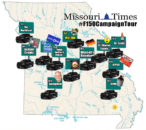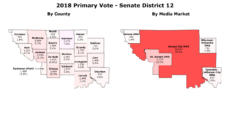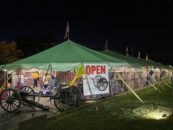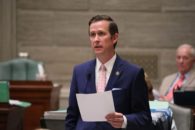A month after new electric transit buses were introduced in Kansas City, U.S. Congressman Emanuel Cleaver is seeking federal funds to bolster the city’s electric fleet.
Cleaver requested $6 million to go toward six electric buses, costing around $1 million each. The proposed earmark came at the behest of the Kansas City Area Transportation Authority (KCATA) and would be part of an increased focus on transportation and infrastructure from Congress and the new presidential administration.
“At a time when we’re trying to take more and more fossil fuel-propelled vehicles off the street, this becomes a clean energy issue,” Cleaver told The Missouri Times. “We think this money will make a big splash in terms of our ultimate goal, which would be to change out the entire fleet.”
The city’s fleet currently consists of around 300 buses with 31 covering the metro area express (MAX) rapid bus transit service. Cleaver was on hand for the unveiling of KCATA’s two new electric buses last month, speaking on the impact of free transportation and clean energy. The buses, a partnership between KCATA and Evergy, were an effort to reduce costs for both the city and commuters.
Cleaver said the city had expected the process of converting its fleet would take years, and this investment would help expedite the transition process. One of the biggest advantages of freeing up city resources, he said, was the possibility of free transportation which would bolster workforce development and attract businesses to the city.
“One of the things that I think is important that we don’t talk about much is if we can free up the KCATA from the need to acquire these buses, it saves revenue that can be used to offer free rides to anyone who wants to get on the bus,” he said. “As I told them, it’s an economic development issue. What city would not benefit by promoting nationally that if you relocate your business to Kansas City, your workers get that additional financial benefit?”
Cleaver is not alone in his quest for federal funding. He pointed to Kansas Congresswoman Sharice Davids who submitted a $4.5 million request for the transition, seeking to reduce congestion on Kansas City roads and bolster the city’s clean energy initiatives on the other side of the state line. Legislators across the country have submitted similar funding requests for transit systems, bridges, and roads as President Joe Biden pushes a sweeping infrastructure plan and another transport funding bill takes its first steps in Congress.
Cleaver said the opportunity to raise awareness about clean transportation and renewable energy amid the Kansas City public was an added bonus of the transition. With electric vehicles rising in popularity across the country and the costs of transportation increasing, he said the investment would be an opportunity to enhance the vitality of the city’s transit system and benefit the community at a reduced cost.
“We may have come a little late to the table to get a subway system or a light rail system because costs have just exploded,” Cleaver said. “Being one of the largest cities in the country, the cost of any form of mass transportation costs a lot of money, but we still believe we can develop these systems to move workers from their neighborhoods to their workplaces, and with these electric buses we will be able to carry a lot of passengers to work every day.”
Cover photo provided by Cleaver’s office.

Cameron Gerber studied journalism at Lincoln University. Prior to Lincoln, he earned an associate’s degree from State Fair Community College. Cameron is a native of Eldon, Missouri.
Contact Cameron at cameron@themissouritimes.com.




































